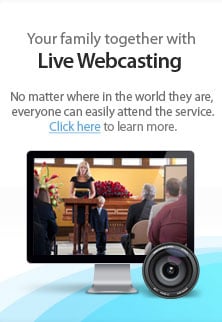- >About Us
- >Location
- >Contact Us
- Phone: (248) 543-1622
Frequently Asked Questions
We have heard thousands of questions, and chosen to provide you with the answers to some of the more common questions relating to a funeral, a funeral service and funeral homes.
- What is a funeral?The funeral is a ceremony of proven worth and value for those who mourn. It provides an opportunity for the survivors and others who share in the loss to express their love, respect and grief. It permits facing openly and realistically the crisis that death may present. Through the funeral, the bereaved take that first step towards emotional adjustment to their loss.
- What type of service should I have?Only you can answer that question. The type of service conducted for the deceased, if not noted in a pre-plan, is decided by the family. The service is usually held at our funeral home, as a graveside service or at a cemetery chapel. The presence of friends at this time is an acknowledgment of friendship and support. A private service is by invitation only where selected relatives and a few close friends attend the funeral service.
- Should I bring my children to the service? You know your children better then anyone else and so the final decision is always yours. But there can be many questions in regard to bringing children to a funeral. After all, they have a right to grieve as well. Call our Managing Funeral Director, Otto B. Dube at (248) 543-1622 and he will discuss all of the possibilities with you. He is available for personal talks with your children and will also give them a tour of our facilities in order to ease their minds.
- Why do we need an obituary notice?It is helpful to friends and the community to have an obituary notice published announcing the death and type of service to be held. A notice can be placed in a local newspaper, or on the Internet.
- What do funeral directors do?Funeral directors are both caregivers and administrators. In their administrative duties, they make the arrangements for transportation of the body, complete all necessary paperwork, and implement the choices made by the family regarding the funeral and final disposition of the body. As caregivers, funeral directors are listeners, advisors and supporters. They have experience assisting the bereaved in coping with death. Funeral directors are trained to answer questions about grief, recognize when a person is having difficulty coping, and recommend sources of professional help. Funeral directors also link survivors with support groups at the funeral home or in the community.
- What should I do if the death occurs in the middle of the night or on the weekend?We are available 24 hours a day, seven days a week. All you need to do is place a call to us at (248) 543-1622.
- What should I do if a death occurs while away from home?We can assist you with arrangements anywhere in the world. Contact us first and we can guide you. We will assume responsibility and coordinate the arrangements for the return of the deceased person to Detroit.
- Is embalming mandatory by law?No. But, certain factors of time, health and possible legal requirements might make embalming either appropriate or necessary. Please note that embalming may be required if the deceased is being transported by air to another country where local laws need be observed. Because embalming is a form of preservation, Judaism is usually against it as everything that comes from the earth, should return to the earth.
- Is it possible to have a traditional funeral if someone dies of AIDS?Yes, a person who dies of an AIDS-related illness is entitled to the same service options afforded to anyone else.
- Are funerals expensive?The type and cost will vary according to the preferences of the consumer. A funeral home is a 24-hour, labor-intensive business, with extensive facilities including Taharah rooms and equipment, chapels, limousines, hearses, etc.; these expenses must be factored into the cost of a funeral. Moreover, the cost of a funeral includes not only caskets, and sometimes vaults (depending upon the cemetery requirements), but also the services of the funeral staff in making arrangements with the family and arranging transportation of the deceased, filing appropriate forms, dealing with doctors, clergy, newspapers, and seeing to all the other cricitcal details. Unlike other funeral homes, HEBREW MEMORIAL CHAPEL is a community-owned funeral home and profit is not our motive. WE ARE YOUR FUNERAL HOME.
Common Cemetery Questions
The answers below are here because these are the most commonly-asked questions. If yours isn't listed, we invite you to call us. We're here to provide the information you need, when you need it.
- Are cemeteries running out of space?Just like other open spaces, cemeteries are impacted by increased population density in both urban and rural areas. Cemetery spaces are a finite resource, and as such, are at a premium in some regions.
- What is Perpetual Care?"Perpetual Care" in the Detroit area for Jewish cemeteries usually refers to summer flower planting and sometimes winter care as well. Each cemetery has its own particular definition of what is provided and of course there is a pre-determined charge for each of these services.
- Are vaults a State Law? No. In most areas of the country, state or local laws do not require that you buy a container to surround the casket in the grave. However, some cemeteries require that you have such a container so that the ground will not sink. Either a grave liner or a burial vault will usually satisfy these requirements. Each cemetery has their own set standards. Some cemeteries allow them and others refuse them for religious reasons. You can call us with any concerns.


